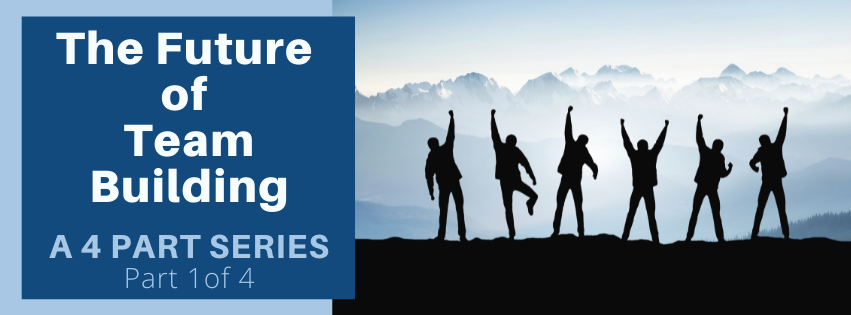
In our series on the future of team building we start with the definition of team building. We explore the origins of the term and how it’s evolved in recent history.
A Goal or a Buzzword?
What is the definition of team building? Ultimately the goal is to create a workplace that provides team members with a fulfilling and supportive environment and has high productivity results. How is this achieved? It can be an organic evolution as a group of people come together, connect effectively, and produce above average results. The challenge with relying on the organic approach is that sometimes it happens and sometimes it does not. To provide a higher likelihood of achieving a positive team culture and superior results we turn to team building.
The term team building is a bit of a catch-all term that can mean everything from a social gathering, a meal together, a fun team competition or an in-depth leadership development workshop. Team building can be all these things and they are all important. We see the creation of a high-performance team similar to a jigsaw puzzle. There are many, many pieces required to complete the puzzle: work environment, compensation, benefits, and leadership to name a few. Team building is one of the pieces needed to complete the puzzle of a high-performance team.
At a basic level team building can be placed into two broad categories: formal and informal. Informal team building are things such as the team dinners and other generally more organic and self-led recreational activities and events. Formal team building is generally led by an external professional facilitator and has specific goals and methodologies to achieve specific results. This can take the form of a fun team-based photo scavenger hunt or a multi-day learning and development workshop.
Here at Summit, we sub-divide team building into team building and training. Team building programs are generally shorter, lighter in content, and largely focused on building, supporting, and enhancing positive team relationships. Training workshops are focused learning opportunities created to expand knowledge and understanding with the end goal of changing behaviours and creating greater results on team culture and productivity.
Origins of Team Building
Modern team building research can be traced back to its roots in a study by Elton Mayo between 1924 and 1932 at the Western Electric Company, Hawthorn Works. This study became known as the Hawthorn study and showed marked production improvement based on team relationships, team interactions, support, trust, and team pride. Eventually this would become known as team building.

From 1920 to 1974 Kurt Hahn’s work became the foundation of outdoor and experiential learning and development. His work led to the foundation of Outward Bound who largely created the foundation of corporate team building we see today.
Recent History of Team Building
Having been involved in the world of team building for 20+ years I have observed an evolution to arrive at what we see today as team building.
When I first became involved in corporate team building it was through Outward Bound. We used a largely outdoor experiential approach with team challenges and guided debriefs. This was the golden age of the ropes course which I still believe is one of the most powerful team building tools available provided the course is built specifically for an adult audience and for team building purposes (as opposed to recreation) and that it is facilitated properly. We would also frequently take small corporate teams on multi-day canoe and hiking trips which provided such a great learning environment.
Over time the outdoor and challenge element diminished and the formal learning through models, tools and action plans increased. Team building became less organic and more formal. Companies wanted to see real ROI on their investment. As work environments became faster paced the amount of time to dedicate to team building became compressed and we had to accomplish more in a much shorter time frame. Team building went from a multi-day event to a one-day event and in 2019 just before everything was changed by the pandemic, it was even hard for a team to dedicate a full-day and many team building programs would be 2-4 hours.
About The Future of Team Building Series
Welcome to the future. Our world is constantly changing, and the ramifications of Covid-19 will be felt for years to come. We may see some changes caused by this pandemic as negative and some as positive. Regardless, the changes are here to stay, and we need to understand them and to adapt to them. In this 4-part series we will explore where we are coming from, where we are today and where we may be in the future as it relates to corporate team building and training.
About the Author
Scott Kress is an accomplished climber and adventurer. He’s completed the Adventure Grand Slam which includes the 7 summits and the North and South Pole. His storytelling based on his adventures is captivating, but what sets Scott apart is his ability to weave his stories together with his 20+ years of leadership and team development education and experience. Scott is the president of Summit Team Building, and is passionate about helping teams grow and companies flourish.

